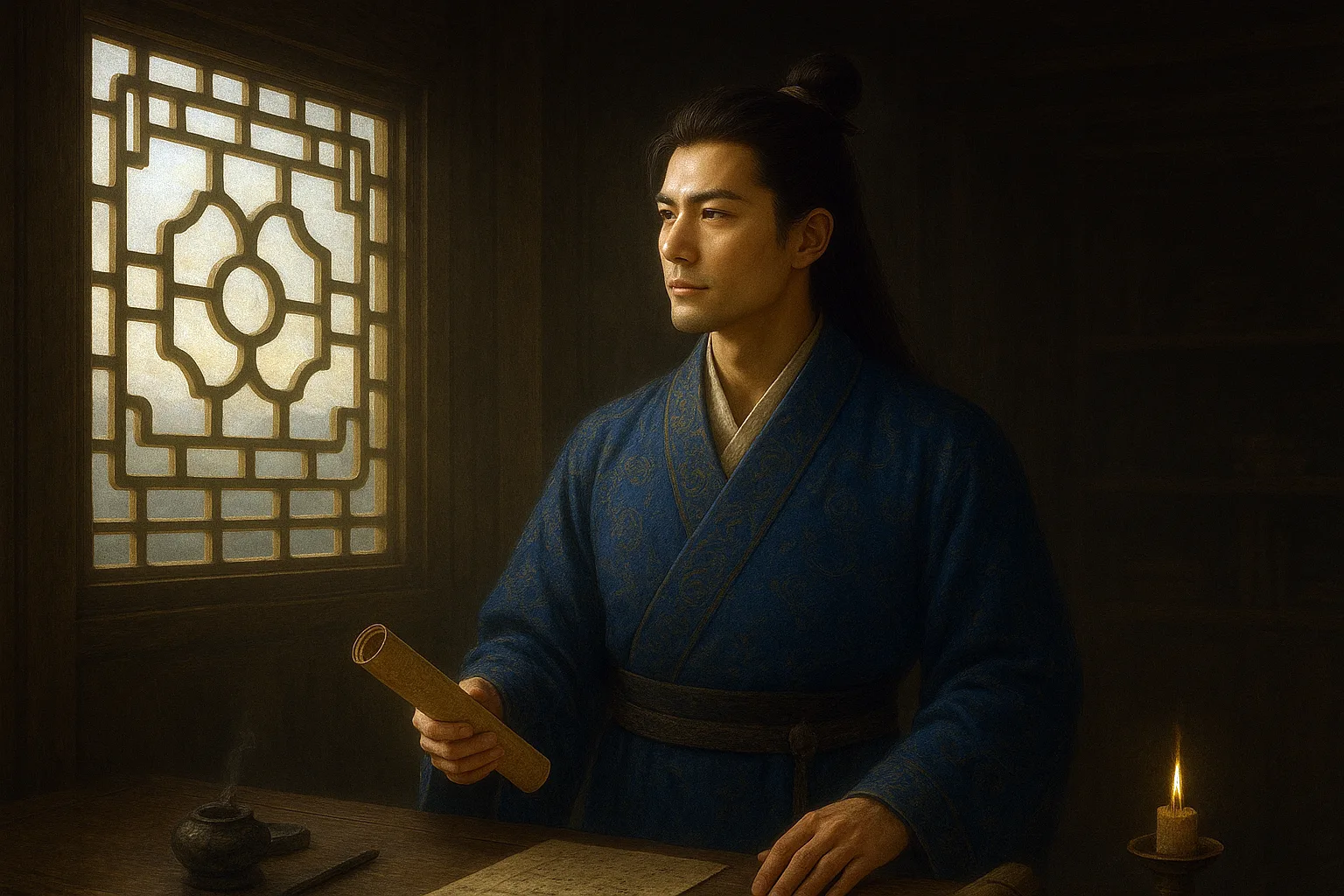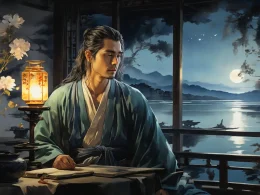It’s not the lord who prized the Palace Phoenix,
Nor the lady who envied the moth-brow fair.
’Twas the barbarian proud who sealed her fate,
And the painter unfair that caused despair.
The Tartar land was bleak where she was wed,
Unlike the Han Palace where she might have stayed.
Her heart was bored and wrapped in deep distress;
What could she say when she must go horsed and arrayed!
Original Poem
「相和歌辞 · 王昭君」
沈佺期
非君惜鸾殿,非妾妒蛾眉。
薄命由骄虏,无情是画师。
嫁来胡地恶,不并汉宫时。
心苦无聊赖,何堪上马辞。
Interpretation
Shen Quanqi stands out among Tang poets for his skill in blending themes of palace lament, frontier life, and historical allusion. His poem "Wang Zhaojun" draws on the story of Wang Zhaojun, a Han dynasty palace lady sent to marry a Xiongnu chieftain during Emperor Yuan’s reign, portraying the sorrow and misfortune of a woman exiled to a foreign land. Originally a beauty in the Han court, Wang Zhaojun was relegated to obscurity after the court painter Mao Yanshou—bribed to distort her portrait—depicted her unfavorably. Later, she was married to the Xiongnu as part of a political alliance, spending the rest of her life on the frontier, never to return to her homeland.
Through Wang Zhaojun’s voice, Shen Quanqi expresses sympathy for the fate of women, criticism of political systems, and a deep love and grief for his native culture. The poem not only revisits a historical tragedy but also reflects the poet’s own resonance with exile and powerlessness, having been banished to the southern wilderness himself.
First Couplet: "非君惜鸾殿,非妾妒蛾眉。"
Fēi jūn xī luán diàn, fēi qiè dù é méi.
It was not that you, my lord, cherished not the Phoenix Hall; Nor was it I who envied another’s moth-eyebrow grace.
The poem opens with a parallel negative structure ("非…非…"), establishing a tone of self-justification and dignified resolve. Speaking as Wang Zhaojun, the poet dispels common misunderstandings about her fate: she blames neither the emperor nor other women, instead pointing to the deeper causes of her tragedy—fate and systemic injustice. The couplet’s calm delivery carries an undercurrent of cold realism, setting a tone of "sorrow tempered by reason."
Second Couplet: "薄命由骄虏,无情是画师。"
Bó mìng yóu jiāo lǔ, wú qíng shì huà shī.
A wretched fate, wrought by the arrogant tribes; Yet heartless above all was the court painter’s hand.
This couplet strikes at the heart of the tragedy. "Arrogant tribes" refers to the powerful Xiongnu, while "court painter" alludes to Mao Yanshou’s deception. With deft irony, Shen Quanqi critiques both external threats that reduce women to political pawns and internal court corruption that betrays integrity. The lament expands from personal misfortune to societal injustice, blending grief with implicit critique.
Third Couplet: "嫁来胡地恶,不并汉宫时。"
Jià lái hú dì è, bù bìng hàn gōng shí.
Since wedding this harsh land of barbarians, Nothing compares to my days in the Han palace.
Here, the focus shifts to her present reality. "Harsh land" conveys both environmental desolation and cultural alienation, while "nothing compares" underscores the irreparable loss of her former life. Through spatial contrast, the poet highlights the tension between civilization and wilderness, warmth and isolation.
Fourth Couplet: "心苦无聊赖,何堪上马辞。"
Xīn kǔ wú liáolài, hé kān shàng mǎ cí.
My heart suffers, devoid of all solace— How can I bear to mount the steed and bid farewell?
The poem concludes by returning to the iconic moment of Wang Zhaojun’s departure. "How can I bear" carries immense emotional weight, capturing the agony beneath her ceremonial composure. Shen Quanqi freezes this moment of psychological rupture, using restraint to amplify the tragedy.
Holistic Appreciation
Written as a monologue, the poem traces Wang Zhaojun’s tragedy with clarity and emotional depth. The first two couplets examine the causes of her plight, while the latter two depict her present suffering, blending personal sorrow with systemic critique.
Shen Quanqi elevates the tradition of palace lament by balancing emotion with reason:
- He moves beyond the ornate style of Six Dynasties poetry, using intellectual clarity to deepen emotional impact.
- He refracts historical tragedy through female suffering, linking individual fate to broader political and ethnic conflicts.
- The concluding line, "How can I bear…," epitomizes his art of restraint, using silence to convey profound sorrow.
The poem’s plain language belies its rich imagery, achieving what might be called "the power of unadorned truth." Wang Zhaojun’s "heart devoid of solace" echoes Shen Quanqi’s own powerlessness between exile and authority, elevating the poem beyond its subject to become one of the most humanistic Yuefu works of the Tang.
Artistic Merits
- Persona and Emotional Authenticity: The first-person voice immerses readers in Wang Zhaojun’s perspective, enhancing empathy.
- Narrative and Lyricism: Concise storytelling and condensed emotion merge historical resonance with poetic sensibility.
- Structural Rigor and Progression: The poem moves logically from negation to accusation, contrast to climax, creating a cohesive arc.
- Reason Infused with Emotion, Emotion as Critique: More than a lament, it carries layered political satire.
- Restrained Conclusion with Lasting Resonance: The understated final question reveals heartbreak without explicit outcry.
Insights
Wang Zhaojun’s tragedy transcends her individual fate, mirroring the powerlessness of women manipulated by systems of power and reflecting the poet’s own exile experience. Though destiny may be beyond one’s control, Shen Quanqi’s calm documentation of human dignity and sorrow reminds us to cherish freedom and authenticity, lest beauty and hearts be corrupted by worldly compromises.
About the Poet

Shen Quanqi (沈佺期 c. 656–715), courtesy name Yunqing, was a native of Neihuang in Henan Province and an important poet of the early Tang Dynasty. Along with Song Zhiwen, he was renowned as one of the "Shen-Song" duo, whose work played a decisive role in finalizing the form of the five-character regulated verse (wuyan lüshi) in Tang poetry. His poems often include courtly compositions and travel-themed reflections, characterized by refined elegance and structural rigor. Shen was particularly skilled in the seven-character regulated verse (qilü), and his writing marks a transition from the lingering style of the Six Dynasties to the flourishing era of High Tang poetry. His contributions hold milestone significance in the development of modern-style verse (jintishi).












